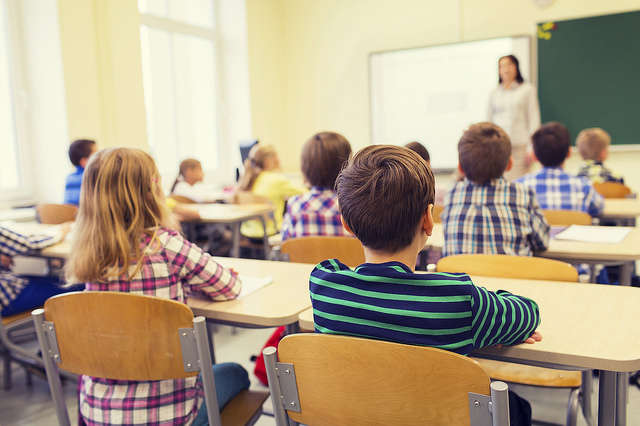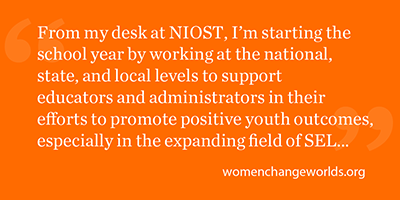 It’s back-to-school time and families, youth, and educators must adjust their schedules for another school year. In the midst of the forms and information families receive – or that get “lost” in a child’s backpack or locker – you may have heard something about a social and emotional learning (SEL) initiative or curriculum. In fact, the local school system in my rural, seaside community is convening a team of educators to consider how SEL can inform and improve what teachers are already doing to promote positive youth outcomes.
It’s back-to-school time and families, youth, and educators must adjust their schedules for another school year. In the midst of the forms and information families receive – or that get “lost” in a child’s backpack or locker – you may have heard something about a social and emotional learning (SEL) initiative or curriculum. In fact, the local school system in my rural, seaside community is convening a team of educators to consider how SEL can inform and improve what teachers are already doing to promote positive youth outcomes.
SEL refers to the way individuals learn and use a set of social, emotional, behavioral, and character skills to navigate successfully in school, work, and relationships across the lifespan. Related experiences, programs, and curriculum vary widely just like the school or afterschool settings in which they are taught. Whether the particular program is focused on conflict resolution, character education, bullying prevention, or another version of social skills instruction, the development of SEL programs is based on the consensus among social scientists, educators, and health care professionals that social and emotional skills matter. The positive youth outcomes from high-quality, evidence-based SEL programs include improvements in behavior, attitudes, and academic outcomes. (Durlak, J. A., Weissberg, R. P., Dymnicki, A. B., Taylor, R. D., & Schellinger, K. B. (2011). The impact of enhancing students’ social and emotional learning: A meta-analysis of school-based universal interventions. Child Development, 82(1), 405- 432).
Across the country at all levels of education – from state administrators of federal child care funds to infant-toddler and early childcare teachers or public school and afterschool leaders – a focus on SEL practices is gaining ground. For many, this is not a new conversation.
Here at the Wellesley Centers for Women, SEL has been an ongoing part of our work for the past thirty years.
- In 1987, Open Circle was launched as a research project committed to the social and emotional wellbeing of children. Today, Open Circle provides a unique, evidence-based SEL program for grades K-5 aimed at proactively developing children’s skills for recognizing and managing emotions, positive relationships and problem solving, as well as helping schools develop a community where students feel safe and engaged in learning.
- The National Institute on Out-of-School Time (NIOST) has brought national attention to the importance of children's out-of-school time using research, training, and advocacy to strengthen children's emotional, physical, and social development.
 From my desk at NIOST, I’m starting the school year by working at the national, state, and local levels to support educators and administrators in their efforts to promote positive youth outcomes, especially in the expanding field of SEL. Specifically, I am researching the SEL programs that states are currently adopting in preparation for our forthcoming workshop for out-of-school time (OST) leaders on how to integrate these practices into school-age child care or other OST settings. As I do this work, my background as a former school committee member and education advocate means I can’t resist passing along the newest SEL information that comes across my desk to the regional school administrators in my community who are convening the SEL planning discussions for local schools.
From my desk at NIOST, I’m starting the school year by working at the national, state, and local levels to support educators and administrators in their efforts to promote positive youth outcomes, especially in the expanding field of SEL. Specifically, I am researching the SEL programs that states are currently adopting in preparation for our forthcoming workshop for out-of-school time (OST) leaders on how to integrate these practices into school-age child care or other OST settings. As I do this work, my background as a former school committee member and education advocate means I can’t resist passing along the newest SEL information that comes across my desk to the regional school administrators in my community who are convening the SEL planning discussions for local schools.
If you want more information about SEL programs and practices, check out the Wallace Foundation’s May 2017 report, Navigating SEL from the Inside Out.
If you simply want to celebrate the importance and purpose of afterschool care for the wellbeing of children and families, consider joining the 18th annual Lights On Afterschool on October 26, 2017. This campaign includes a series of events across the U.S. promoting awareness of the many ways OST programs contribute to positive youth outcomes and children’s wellbeing.
If you have other ideas or resource recommendations for how SEL can be incorporated more into OST programming, please share in the comments. Let’s make this a rewarding year all-around for our young people and those who support them!
Gwynne Guzzeau, M.S., J.D., is a research associate at the National Institute on Out-of-School Time at the Wellesley Centers for Women, Wellesley College. She has been affiliated with the Gestalt International Study Center for a number of years as a faculty member and Professional Associate and served as executive director from 2014-2016.


